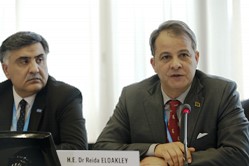By Libya Herald reporters.

Tripoli, 29 January 2016:
Libya has begged the World Health Organisation to press ahead with a $50-million assistance programme . . .[restrict]as the chaos in the country’s health service reaches crisis levels. At stake, it says, are the critical health needs of two and a half million people.
However as of last month, less than $3 million had been pledged by member states. South Korea has put up $1.5 million, the US $700,000 and the EU $540,000.
Health minister Reida Oakely has been in Geneva to warn of imminent disaster. “The health situation in Libya is rapidly deteriorating,” he told a special briefing at WHO headquarters, “with extensive displacement, damage and closure of health facilities in conflict areas”
Oakley added “Repeated rounds of violence have not allowed for a proper recovery of the health system, which even prior to the crisis, was struggling to meet the basic needs of the Libyan population”.
The WHO’s Libya representative Syed Jaffar Hussain warned that it was not possible to wait for a political solution.
“We need to act now. We need both financial resources and the international humanitarian community to step up efforts to help save the lives of children, mothers and the elderly who are most at risk. This is not about politics, it is about health needs.”
Nearly half the Libyan population was affected by the conflict. Approaching three quarters of all health facilities were closed or not working fully. More than 80 percent of nursing staff were lost when almost all foreign medical personnel were evacuated in the summer of 2014. Since then 20 hospitals and clinics have been damaged and five health workers killed. Most international agencies have moved specialist staff out to Tunisia.
Meanwhile hospitals were suffering from shortages of drugs and basic medical supplies. The situation was particularly bad in the east, said the WHO, where the main warehouse in Benghazi was destroyed in the fighting at a time when it has just been filled with new supplies. As a result Benghazi has frequently had to turn to Tripoli hospitals for supplies, where stocks are also running low.
Hussain said the WHO was committed to providing healthcare to everyone, irrespective of their religion, politics or nationality. “ This is our moral obligation, ” he said, “ We are calling on all parties to guarantee unrestricted, long-term delivery of humanitarian aid and unconditional movement of health workers”. [/restrict]







